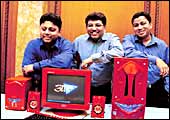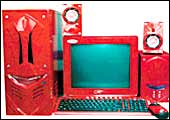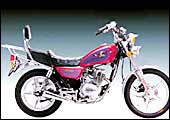 |
| The volume players: (From L to R) Xenitis
MD T. Dutta, Xenitis Infotech CEO D.N. Nair and Group Chairman
S. Ghosh |
The
appointment was for 2 p.m. it's past 4 p.m; we've been waiting
for two hours, but there's still no sign of Santanu Ghosh or Tathagata
Dutta, co-promoters of the Xenitis Group. The receptionist at
the group's plush new office in central Kolkata apologises for
the umpteenth time. "They're both extremely busy," she
repeats somewhat sheepishly. It's another 30 minutes before we're
finally ushered into Ghosh's 400 sq. ft paperless office. "Extremely
sorry, but we are really pressed for time these days," says
Ghosh, Chairman, Xenitis Group.
That's understandable; the two co-promoters,
both in their mid-30s, have their plates full. The five-year-old
Xenitis Group, which created the sub-10K segment in the personal
computer (PC) market, is already one of the largest volume players
in the country. Its brands: Aamar PC in the east, Aamchi PC in
the west, Aapna PC in the north and Namma PC in the south. Turnover
has grown from Rs 7 crore in 2000-01 to Rs 178 crore in 2004-05;
the company clocked sales of Rs 230 crore in the first half of
the current fiscal ended September 30, 2005, and looks set to
achieve its target of ending the year with a turnover of Rs 500
crore. "We hope to grow our topline to Rs 1,000 crore by
the end of 2006-07," says Ghosh.
Recently, Xenitis set up a Rs 200-crore state-of-the-art
components manufacturing unit at Chinsurah, in West Bengal, in
technical collaboration with Unitek Computer Company of China.
Xenitis will manufacture computer cases, SMPs (switch mode power
supply) units, media chips, peripherals like keyboards, mice,
CD-ROM and CD-DVD drives, speakers and home theatres at this facility.
This will enable it to expand its capacity from 2.4 lakh PCs a
year to at least 4.20 lakh PCs a year. The funds for this project
have come from internal accruals and bank loans, says Ghosh. Incidentally,
Xenitis makes more than just cheap computers. Its product range
includes higher range PCs, laptops, servers and media centres
as well (see The Xenitis Range). "Our endeavour is to take
India's it hardware industry to the world. Our goal is to make
PCs as common as televisions and capture a major chunk of this
incremental market. That means targeting retail customers, SMEs,
larger corporates and educational institutions," he adds.
They have already travelled part of the way
to their target. "I think Xenitis' range of Amar PCs (and
regional variations of the brand) has played a big role in improving
PC penetration in the country. But its acid test will lie in receiving
repeat orders or orders through referrals from existing clients,"
says Sanjay De, Director, JGD Technovision Pvt. Ltd, one of the
leading dealers of multi-brand PCs in the country.
Cut to five years ago. That was when Ghosh
and Dutta, who are childhood friends, quit their jobs as Team
Leader, IBM (East), and Channel Manager, HCL, respectively, and
founded Xenitis. Their exposure to the world of PCs-they had worked
in market leaders such as Digital, Compaq, Godrej Pacific and
HCL-had opened their eyes to a potential gold mine: they realised
that they could bundle open source software with cheap hardware
from China and Taiwan to offer reliable branded PCs. The initial
investment: Rs 25 lakh, their combined life savings. "From
the very beginning, our focus has never wavered," says Ghosh.
THE XENITIS RANGE
Existing Products |
|
|
The Aapna range:
It's affordable
Desktops:
9,790-25,000
Laptops: 25,000-65,000
Servers: 40,000-1.5
lakh
MEDIA CENTRES:
35,000-1.25 lakh
COMPONENTS:
Cabinet, Keyboard, Mouse,
Power Supply, Speakers: 1,200
|
| ON THE ANVIL |
|
100cc motorcycles 24,000
125cc motorcycles 29,000
150cc motorcycles 39,000
|
|
|
| All figures in Rs |
Xenitis now manufactures everything apart
from hard discs and CPUs at its own plant. It makes it own cabinets,
keyboards, power supply units, mice and speakers there; and will
soon start manufacturing monitors, motherboards, memories, floppy
drives and CD drives in-house as well. Laptops, servers and media
centres are also round the corner. Export orders are pouring in
from Africa, Dubai, Bangladesh and Nepal and these now account
for 10 per cent of sales.
Having established a significant footprint
in the PC segment, the duo is now looking ahead. "This is
the right time to reboot," says Ghosh. On the anvil is a
two-wheeler venture. "There is a large demand-supply gap
in motorcycles; and we feel we can replicate our PC success in
this segment by playing the price card," he adds.
Xenitis has already tied up with China's
Guangzhou Motors Group for a Rs 200-crore two-wheeler manufacturing
facility, also at Chinsurah. Work on putting up lines for assembling
semi-knocked down (SKD) and completely knocked down (CKD) kits
imported from its collaborator is on in full swing at its 30-acre
factory there and the first motorcycle is expected to hit the
roads in March 2006. The brandname: Xoom. The variants: two apiece
in the 100cc, 125cc and 150cc segments. The price: sub-Rs 30K.
Says Ghosh: "We want to retain the X-factor of Xenitis."
Ghosh and Dutta are aiming high. They plan
to start with 30,000 units per month; double this to 60,000 units
within six months of operation, and, then, ramp up output to one
lakh motorcycles per month in two years. The agreement with Guangzhou
Motors also envisages the setting up of an engine manufacturing
unit in the country. Dutta, who is Managing Director of the company,
however, adds that it's too early to talk about manufacturing
engines in India. "This will come only a few years later,"
he says. The Chinese company has a technical collaboration with
Honda Motors of Japan for its engine manufacturing facility at
Guangzhou in China. Won't this lead to a conflict of interest
with Honda's existing operations in the country? "No,"
says Ghosh, "Guangzhou's agreement with Honda permits such
collaborations."
D-Day is less than six months away. The Xenitis
brass is burning the midnight oil strategising with leading consultants
like PricewaterhouseCoopers and KPMG, putting in place dealer
and service networks across the country, and convincing ancillary
units to set up units near its plant at Chinsurah in Hooghly district.
Ghosh declines to name any of the players he is talking to. "They're
all big players in this sector, but we can't reveal names till
we finalise our arrangements with them," he says.
"The two-wheeler business in the country
is growing at 35 per cent per annum. Four major brands command
90-95 per cent of the market. Our target is to take a 5 per cent
share from each; that way we can start with a 20 per cent market
share," says Ghosh, adding: "Don't think that's a tall
order. Our greatest achievement in the PC sector has been to force
every other player to cut prices. We will do exactly the same
with two-wheelers."
Brave words. They could even make it to the
long list of famous last words. The road ahead promises to be
bumpy. Two-wheelers are a very different ball game from PCs. It's
one thing to import computer parts at cut rates from China and
Taiwan and assemble cheap computers in India. It's quite another
to put in place an eco-system that supports a large two-wheeler
operation. "Since they will import CKD and SKD units, getting
started may not pose too much of a problem. But capturing market
share with a lesser-known Chinese two-wheeler brand will be no
mean a task as several globally established brands are freely
available in the country. The entire business model rests on the
price advantage. But it remains to be seen whether there is at
all a big market for low-end two-wheelers in India," says
an industry analyst. And that's not counting the obvious problem
of taking on entrenched players like Hero Honda, Honda Motors,
Bajaj Auto and tvs, all of whom have much deeper pockets than
Ghosh and Dutta. The duo is aware of these issues and so, is trying
to plug these holes with the help of MNC consultants and business
advisors. The Bajaj Auto and Hero Honda spokespersons declined
to comment when BT sought their opinions on the impending entry
of Xenitis into their home turf.
There is also a growing concern that Xenitis
is spreading itself too thin. The two-wheeler project is coming
up at a time when its PC business is in aggressive expansion mode
and the group has also taken up a major media venture (read: a
24-hour Bengali news and entertainment channel, a vernacular daily
and a special interest magazine). The group is pumping in Rs 80
crore into its media foray. "We are extremely upbeat about
this and have hired the best brains in the industry," says
Dutta. The duo is setting up a new company to execute the media
project, with Suman Chattopadhyay, former Executive Producer,
Star Ananda, as the third promoter. There are whispers that the
channel is being financed by a cartel of coal traders, but Ghosh
and Dutta brush these aside. "All the money is coming from
internal accruals and from bank loans. We're aiming high because
we believe that if you have to do something, then you should do
it in a big way and do it in style," says Ghosh.
Xenitis is the archetypal small company that's
dreaming big. So far, it's stuck to its knitting, ridden its luck
and managed to come out on top. Now it has ventured into unrelated
fields, strewn with the carcasses of other adventurers. Whether
it can stay on its growth curve will be interesting to watch.
|






